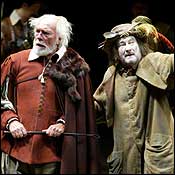
King Lear is Shakespeare’s greatest play, and Christopher Plummer is one of our greatest actors. So what happens when these two greatnesses converge? Disaster. How could this be, in a production that originated at Canada’s worthy Stratford Festival, and transferred, with minor changes, to the equally worthy Lincoln Center Theater?
First off, Lear today demands more than a provincial-rep-style unit set—or can you fit a stormy heath and a battlefield into even a spacious antechamber? Also, can you fight a war in evening gowns, as designed by Clare Mitchell for women warriors, no doubt with the approval of the director, Jonathan Miller? Mitchell and Miller have turned Goneril and Regan, in near-identical ocher outfits and extravagant hairdos, into a comic version of Cinderella’s ugly stepsisters, with performances to match. In angelically cerulean attire, by contrast, Claire Jullien is a bland, pasty, eminently banishable Cordelia.
Miller is a first-rate intellectual but an unreliably quirky, quixotically overcerebral, hit-or-miss director. Plummer is an actor in the heroic mold: Cyrano, Pizarro, Danton, Macbeth, Captain von Trapp, John Barrymore—even such outsize villains as Satan and Iago—are grist for his mill; but neither Miller’s deconstructive revisionism nor, alas, Lear suits him. The king starts out as a blustering despot, which Plummer plays superbly. But then Lear must become a baffled, humbled man, a ranting malcontent, a madman humanized by suffering, a broken wreck, and, finally, a doomed, heartbreaking hero. None of this is the dashingly handsome, jauntily witty, musical-voiced, charmingly matinee-idolish Plummer’s meat. His Lear, instead of gaining in stature, decreases in it; if he grows in humanity, it is a rote, actorish humanity, not a transfigured, radiant warmth.
There are only three accomplished performances, two of them villains. Benedict Campbell is a forthright, no-nonsense Kent; Brian Tree, an amusingly self-important Oswald; and Geraint Wyn Davies, an Edmund who gets a jokey, almost jovial pleasure from his villainy. He is certainly more impressive than his namby-pamby, goody-goody brother, Brent Carver’s mechanically rattled-off Edgar, scarcely different from his gibberingly puny Poor Tom. Ian Deakin’s Albany suffers from a high-pitched voice unbefitting his too ample frame; Stephen Russell’s Cornwall is a bit of a hammy poseur; while James Blendick is a toilsome, road-company Gloucester. Barry MacGregor might have made a good Fool had he not been costumed as a walking tepee. Altogether, Miller has directed an operetta-style production, in which nearly all the memorable lines are throwaways and even the sublime final scene is mangled beyond recognition. Everything here is contrived to be nothing like ever before; but, as Lear observes, nothing will come of nothing.
I would call Nicky Silver’s Beautiful Child idiotic, if that were not an insult to idiots. The play is so bad that I felt sorry not only for the good actors in it (Penny Fuller, George Grizzard, and Steven Pasquale), but also for the mediocre (Kaitlin Hopkins) and downright poor (Alexandra Gersten-Vassilaros, who is also a playwright). I will not summarize it, though not out of consideration for the author—he deserves none—but because you wouldn’t believe me if I did. Still, I can give you some idea of this play by saying that if you were to crossbreed Albee at his worst and Kushner at his average, Child is what you would get. And I can tell you that the young grade-school teacher and pedophile who comes to his parents asking them to hide him (from what?) is taken in on “harsh conditions.” Of what these are, I can give you only a hint: Think Oedipus Rex.
An earlier play by Tracy Letts, Killer Joe, did nothing for me; his current one, Bug, is considerably more interesting. Agnes, a 40-plus waitress in Oklahoma City, lives in a motel; her ex-husband, the brutish Goss just released from prison, is harassing her. Long ago, her little son vanished from outside a supermarket. She dreams about him constantly, and hasn’t had a man in years. Now her lesbian friend, R.C., has come to invite Agnes to a party, and brings along a young drifter, Peter, she has picked up along the way.
Agnes doesn’t want to go to the party, and Peter, who has neither a job nor a place to stay, chooses to remain with her; Agnes lets him sleep, platonically, on her floor. Though rather taciturn, he is good-looking; that and Goss’s intimidating pestering make Agnes promote Peter from floor to bed. Peter, at first so quiet and unassuming, turns out to be an Army deserter. He may also be a psychopath. As he and Agnes free-base together, he lets on that he has been the military’s guinea pig: The eggs of dangerous bugs have been implanted in him; mating with Agnes, now infected by Peter, will result in millions and provide the Army with a lethal weapon. This is why bugs are—or seem to be—cropping up in Agnes’s bed, and on Peter’s and Agnes’s bodies. This, too, accounts for the constant helicopter surveillance above the motel room.
So credible is Peter that the enamored Agnes’s believing him and getting sucked into an escalating folie à deux becomes terrifyingly convincing. Dread things are in the offing. Letts writes deftly, even as his melodrama also plays, I assume deliberately, as horrific farce. Whether melodrama, farce, or even tragedy, it holds the attention. Credit is due Dexter Bullard’s dexterous direction as well, and the compelling ensemble work by a cast of five. Michael Shannon does a powerful job as a both silken and maniacal Peter, but Shannon Cochran, as Agnes, is simply sensational. Her performance, of a tremendously moving transparence that allows us to follow her intimate feelings and innermost conflicts in all their shattering pathos, is one that you—I guarantee it—will never forget.